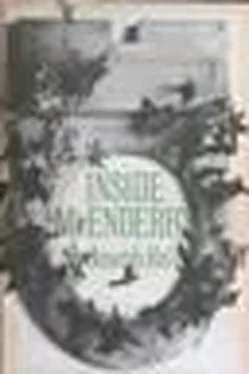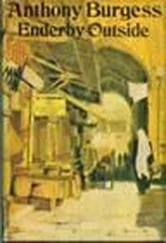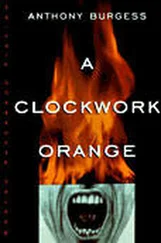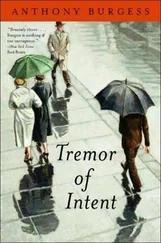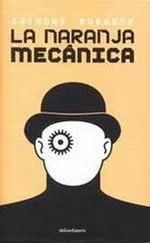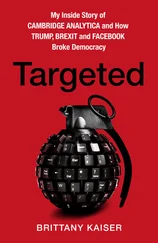"What's this? What's going on?" asked an official voice.
"Eh?" It was the law, inevitably. "I'm looking for these blasted birds," said Enderby, rummaging again. "Ah, thank God. Here they are. Prudence, pigeons. Rooks, caution. It's as good as written. Here." He thrust the extended sheets into the policeman's arms.
"Not so fast," said the policeman. He was a young man, apple-ruddy from the rural hinterland, very tall. "What's this knife for, where did all that blood come from?"
"I've been murdering my stepmother," said Enderby, absorbed in composition. Prudence, prudence, the pigeons call. He ran into the house. The woman from upstairs was just coming down. She saw a knife and blood and screamed. Enderby entered his flat, ran into the bathroom, kicked on the heater, sat on the low seat. Automatically he stood up again to lower his trousers. Then, all bloody, he began to write. Somebody knocked-imperious, imperative-at his front door. He locked the bathroom door and got on with his writing. The knocks soon ceased. After half an hour he had the whole poem on paper.
"Prudence! Prudence!" the pigeons call.
"Scorpions lurk in the gilded meadow.
An eye is embossed on the island wall.
The running tap casts a static shadow."
"Caution! Caution!" the rooks proclaim.
"The dear departed, the weeping widow
Will meet in you in the core of flame.
The running tap casts a static shadow."
The injunction of the last stanza seemed clear enough, privy enough. Was it really possible, he wondered, for him to follow it, making this year different from all others?
"Act! Act!" The ducks give voice.
"Enjoy the widow in the meadow.
Drain the sacrament of choice…"
In the kitchen, he could now hear, the water was still flooding away. He had forgotten to turn it off. Casting a static shadow all the time. He got up from his seat, automatically pulling the chain. Who was this blasted widow that the poem referred to?
While Enderby was breakfasting off reheated hare stew with pickled walnuts and stepmother's tea, the postman came with a fateful letter. The envelope was thick, rich, creamy; richly black the typed address, as though a new ribbon had been put in just for that holy name. The note-paper was embossed with the arms of a famous firm of chain booksellers. The letter congratulated Enderby on his last year's volume- Revolutionary Sonnets- and was overjoyed to announce that he had been awarded the firm's annual Poetry Prize of a gold medal and fifty guineas. Enderby was cordially invited to a special luncheon to be held in the banqueting-room of an intimidating London hotel, there to receive his prizes amid the plaudits of the literary world. Enderby let his hare stew go cold. The third Tuesday in January. Please reply. He was dazed. And, again, congratulations. London. The very name evoked the same responses as lung cancer, overdrawn, stepmother.
He wouldn't go, he couldn't go, he hadn't a suit. At the moment he was wearing glasses, a day's beard, pyjamas, polo-neck sweater, sports-jacket and very old corduroys. In his wardrobe were a pair of flannel trousers and a watered-silk waistcoat. These, he had thought when settling down after demobilization, were enough for a poet, the watered-silk waistcoat being, perhaps, even, an unseemly luxury of stockbroker-like extravagance. He had had it, by mistake, knocked down to him for five shillings at an auction.
London. He was flooded with horrid images, some derived from direct experience, others from books. At the end of the war, searching for William Hazlitt's tomb in its Soho graveyard, he had been abused by a constable and had up in Bow Street on a charge of loitering with intent. He had once slipped on the greasy pavement outside Foyle's and the man who had helped him up-stocky, elderly, with stiff grey hair-had begged five bob to 'elp aht a bit cos they was on strike that week, guv. That was just after he had bought the watered-silk waistcoat: ten bob down the drain. In the urinal of a very foggy pub he had, unbelievably, been invited to a fellation party by a handsome stranger in smart city wear. This man had become nasty at Enderby's polite refusal and threatened to scream that Enderby was assaulting him. Very unpleasant. Along with other memories that made him wince (including one excruciating one of a ten-shilling note in the Café Royal) came gobbets from Oliver Twist, The Waste Land, and Nineteen Eighty-Four. London was unnecessarily big, gratuitously hostile, a place for losing money and contracting diseases. Enderby shuddered, thinking of Defoe's Journal of the Plague Year. And there he was-as he emptied his cold plateful back into the saucepan-with his stepmother again. At the age of fifteen he had bought off a twopenny stall in the market a duodecimo book of recipes, gossip, and homilies, printed in 1605. His stepmother, able to read figures, had screamed at the sight of it when he had proudly brought it home. 1605 was "the olden days", meaning Henry VIII, the executioner's axe, and the Great Plague. She thrust the book into the kitchen fire with the tongs, yelling that it must be seething with lethal germs. A limited, though live, sense of history.
And history was the reason why she would never go to London. She saw it as dominated by the Bloody Tower, Fleet Street full of demon barbers, as well as dangerous escalators everywhere. As Enderby now turned on the hot-water tap he saw that the Ascot heater did not, as it should, flare up like a bed of pain. The meter needed a shilling and he was too lazy to go and look for one. He washed his soup-plate and mug in cold water, reflecting that his stepmother had been a great one for that (knives and forks wrapped in grease as if they were guns). She had been very lazy, very stupid, very superstitious. He decided, wiping the dishes, that he would, after all, go to London. After all, it wasn't very far-only an hour by electric train-and there would be no need to spend the night in a hotel. It was an honour really, he supposed. He would have to borrow a suit from somebody. Arry, he was sure, had one. They were much of a size.
Enderby, sighing, went to the bathroom to start work. He gazed doubtfully at the bathtub, which was full of notes, drafts, fair copies not yet filed for their eventual volume, books, ink-bottles, cigarette-packets, the remains of odd snacks taken while writing. There were also a few mice that lived beneath the detritus, encouraged in their busy scavenging by Enderby. Occasionally one would surface and perch on the bath's edge to watch the poet watching the ceiling, pen in hand. With him they were neither cowering nor timorous (he had forgotten the meaning of "sleekit"). Enderby recognized that the coming occasion called for a bath. Lustration before the sacramental meal. He had once read in some women's magazine a grim apothegm he had never forgotten: "Bath twice a day to be really clean, once a day to be passably clean, once a week to avoid being a public menace." On the other hand, Frederick the Great had never bathed in his life; his corpse had been a rich mahogany colour. Enderby's view of bathing was neither obsessive nor insouciant. ("Sans Souci", Frederick's palace, was it not?) He was an empiricist in such matters. Though he recognized that a bath would, in a week or two, seem necessary, he recoiled from the prospect of preparing the bathtub and evicting the mice. He would compromise. He would wash very nearly all over in the basin. More, he would shave with exceptional care and trim his hair with nail-scissors.
Gloomily, Enderby reflected that most modern poets were not merely sufficiently clean but positively natty. T. S. Eliot, with his Lloyd's Bank nonsense, had started all that, a real treason of clerks. Before him, Enderby liked to believe, cleanliness and neatness had been only for writers of journalistic ballades and triolets. Still, he would show them when he went for his gold medal; he would beat them at their own game. Enderby sighed again as, with bare legs, he took his poetic seat. His first job was to compose a letter of gratitude and acceptance. Prose was not his métier.
Читать дальше
